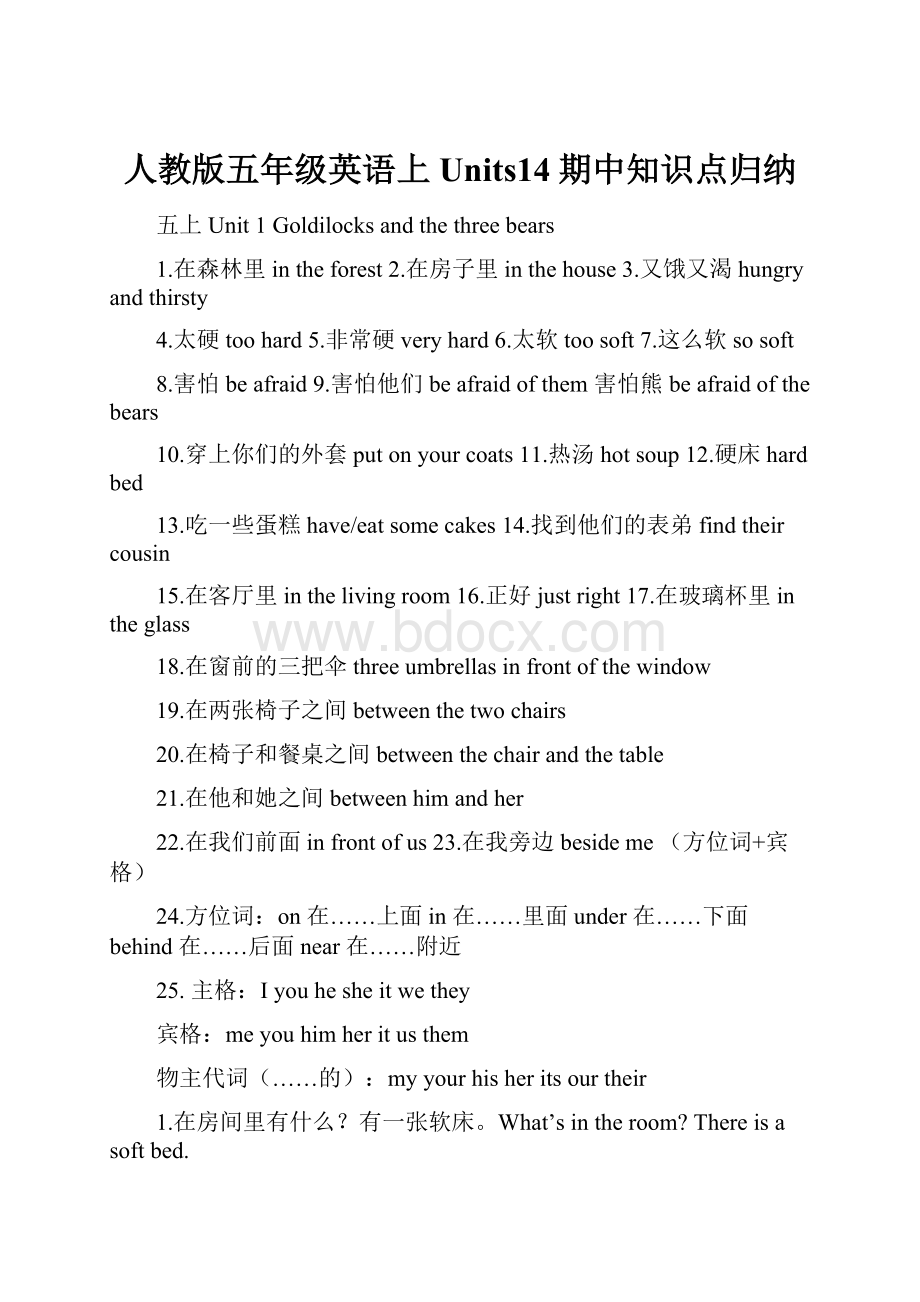人教版五年级英语上Units14期中知识点归纳.docx
《人教版五年级英语上Units14期中知识点归纳.docx》由会员分享,可在线阅读,更多相关《人教版五年级英语上Units14期中知识点归纳.docx(14页珍藏版)》请在冰豆网上搜索。

人教版五年级英语上Units14期中知识点归纳
五上Unit1Goldilocksandthethreebears
1.在森林里intheforest2.在房子里inthehouse3.又饿又渴hungryandthirsty
4.太硬toohard5.非常硬veryhard6.太软toosoft7.这么软sosoft
8.害怕beafraid9.害怕他们beafraidofthem害怕熊beafraidofthebears
10.穿上你们的外套putonyourcoats11.热汤hotsoup12.硬床hardbed
13.吃一些蛋糕have/eatsomecakes14.找到他们的表弟findtheircousin
15.在客厅里inthelivingroom16.正好justright17.在玻璃杯里intheglass
18.在窗前的三把伞threeumbrellasinfrontofthewindow
19.在两张椅子之间betweenthetwochairs
20.在椅子和餐桌之间betweenthechairandthetable
21.在他和她之间betweenhimandher
22.在我们前面infrontofus23.在我旁边besideme(方位词+宾格)
24.方位词:
on在……上面in在……里面under在……下面behind在……后面near在……附近
25.主格:
Iyouhesheitwethey
宾格:
meyouhimheritusthem
物主代词(……的):
myyourhisheritsourtheir
1.在房间里有什么?
有一张软床。
What’sintheroom?
Thereisasoftbed.
2.在森林里有什么?
有许多树和花。
What’sintheforest?
Therearemanytreesandflowers.
3.在桌上有一些汤。
Thereissomesouponthetable.
4.在厨房里有一些。
Therearesomeinthekitchen.
5.在门后有一把伞和两个球。
Thereisanumbrellaandtwoballsbehindthedoor.(就近原则)
6.在沙发下有一些玩具和一个机器人。
Therearesometoysandarobotunderthesofa.(就近原则)
7.在农场上有大量的鸡和鸭。
Therearealotofchickensandducksonthefarm.
8.在碗里没有一些牛奶。
Thereisn’tanymilkinthebowl.(三碗牛奶threebowlsofmilk)
=Thereisnomilkinthebowl.(no=notany)
9.这里没有任何蛋糕。
Therearen’tanycakeshere.
=Therearenocakeshere.(no=nota)
10.蛋糕在这里。
Herearethecakes.
11.多么漂亮的一幢房子啊!
Whatabeautifulhouse!
12.这个汤正好。
Thissoupisjustright.
13.金发女孩害怕。
Goldilocksisafraid.
14.她害怕三只熊Sheisafraidofthethreebears.
15.他/她/它害怕。
He’s/She’s/It’safraid.
16.他们害怕老虎。
Theyareafraidofthetigers.(beafraidof…)
17.蛋糕在哪里?
他们在冰箱里。
Wherearethecakes?
Theyareinthefridge.
18.Bobby在冰箱里看不到(任何)蛋糕。
Bobbycannot/can’tseeanycakesinthefridge.
19.咖啡流行于西方国家。
CoffeeispopularinWesterncountries.(country国家)
20.茶流行于中国。
TeaispopularinChina.(bepopularin在……(地方)流行,流行于)
Unit2Anewstudent
1.七个新学生sevennewstudents2.带他参观showhimaround
3.去看一看goandhavealook4.在二楼onthesecondfloor
5.在她的新学校里inhernewschool6.又唱又跳singanddance
7.喝一些好喝的果汁drinksomenicejuice
8.吃一个好吃的冰淇凌haveaniceicecream
9.太重tooheavy10.去电影院gotothecinema
11.在英国intheUK12.在美国intheUS13.底楼thegroundfloor
14.在操场上intheplayground15.去玩goandplay
16.在秋千上玩playontheswing17.推我pushme
18.再玩一次playagain19.多少音乐教师howmanymusicrooms
20.一个大操场abigplayground
21.classroom,anartroom,computerroom,musicroom,scienceroom,tabletennisroom,library,playground,bedroom,kitchen,livingroom,bathroom,study(书房)
1.这些是教室。
Thesearetheclassrooms.
2.你们的教室在哪里?
我们的教室在三楼。
Where’syourclassroom?
Ourclassroomisonthethirdfloor.
3.在我们学校有多少间教室?
有24间教室。
(Howmany+名词复数+arethere+方位词?
)
Howmanyclassroomsarethereinourschool?
Therearetwenty-fourclassrooms.
4.在公园里有多少个秋千?
有15个。
Howmanyswingsarethereinthepark?
Therearefifteen.
5.在玻璃杯里有多少牛奶?
有一些。
(Howmuch+不可数名词+isthere+方位词?
)
Howmuchmilkisthereintheglass?
Thereissome.
6.在我们的学校里有一间美术教室吗?
是的,有。
不,没有。
Isthereanartroominourschool?
Yes,thereis.No,thereisn’t.
7.在一楼有一些电脑教室吗?
是的,有。
不,没有。
Arethereanycomputerroomsonthefirstfloor?
Yes,thereare.No,therearen’t.
8.Mike的卧室在哪里?
它在一楼。
WhereisMike’sbedroom?
It’sonthefirstfloor.
9.男孩们在哪里?
他们在二楼。
Wherearetheboys?
They’reonthesecondfloor.
10.你的朋友在哪里?
她/他在书房里。
Where’syourfriend?
She’s/He’sinthestudy.
11.你这么重!
You’resoheavy!
12.停!
它太高了。
Stop!
It’stoohigh.
13.它太有趣了!
It’sgreatfun!
14.该吃晚/早/中饭了。
It’stimefordinner/breakfast/lunch.=It’stimetohavedinner/breakfast/lunch.
Unit3Ouranimalfriends
1.一个动物朋友ananimalfriend2.我们的动物朋友们ouranimalfriends
3.又跑又跳runandjump
4.身体部位:
head头eyes眼睛ears耳朵nose鼻子mouth嘴巴body(bodies)身体
anarm手臂hand手leg腿foot(feet)脚hair头发/毛tail尾巴wing翅膀
5.他们的大身体theirbigbodies6.大眼睛bigeyes7.小耳朵smallears
8.长长的黑发longblackhair9.两条短腿twoshortlegs
10.四只白色的脚fourwhitefeet11.黄绿相间的翅膀yellowandgreenwings
12.一条短尾巴ashorttail13.一张大嘴巴abigmouth14.又高又瘦tallandthin15.一个可爱的娃娃acutedoll16.说话和飞talkandfly17.三条鱼threefish
18.橡皮鸭rubberduck19.喜欢雨liketherain20.夏日thesummersun
21.升起comeout22.晴朗的天气sunnyweather23.撑一把伞carryanumbrella
24.在中国inChina25.在美国intheUS26.在英国intheUK
27.在加拿大inCanada28.在澳大利亚inAustralia
29.给我一个桔givemeanorange30.你的手指yourfingers
31.在农场里onthefarm32.画一个动物drawananimal
1.我/你/你们/我们/他们有一个机器人。
I/You/We/Theyhavearobot.
2.我/你/你们/我们/他们没有一个鸡蛋。
I/You/We/Theydon’thaveanegg.
3.他/她/它/Sam有许多贴纸。
He/She/It/Samhasmanystickers.
4.他/她/它/Sam没有任何玩具。
He/She/It/Samdoesn’thaveanytoys.
5.兔子有红眼睛和短尾巴。
Rabbitshaveredeyesandashorttail.
6.那头大象有一条长鼻子和大耳朵。
Thatelephanthasalongnoseandbigears.
7.你/你们有一只兔子吗?
是的,我们有。
不,我们没有。
Doyouhavearabbit?
Yes,I/wedo.No,I/wedon’t.
8.他们/你的朋友们有一只鹦鹉吗?
是的,他们有。
不,他们没有。
Dothey/yourfriendshaveaparrot?
Yes,theydo.No,theydon’t.
9.他/你弟弟/她/它/Sam有一个胖身体吗?
是的,他/她/它有。
不,他/她/它没有。
Doeshe/yourbrother/she/it/Samhaveafatbody?
Yes,he/she/itdoes.No,he/she/itdoesn’t.
10.一个是黑色,另一个是棕色的。
Oneisblackandtheotherisbrown.
11.一个是胖的,另一个是瘦的。
Oneisfat,theotheristhin.
12.他们没有手臂和腿。
Theyhavenolegsorarms.=Theydon’thaveanylegsorarms.
13.它没有手和脚。
Ithasnohandsorfeet.=Itdoesn’thaveanyhandsorfeet.
14.不要叫。
它害怕。
Don’tshout.It’safraid.
15.那两条不是腿。
他们是手臂。
Thosetwoarenotlegs.They’rearms.
16.它的身体非常硬。
Itsbodyisveryhard.
17.谁有一本书?
Whohasabook?
18.一只猫有几条腿?
Howmanylegsdoesacathave?
Unit4Hobbies
1….+动原
can/can’t+动原(Icanswim.Myparents(父母俩)can’tdance.)
Let+动原(Let’sgo.)Don’t+动原wantto+动原wouldliketo+动原
It’stimeto+动原
2….+动ing
like+动ing(Ilikedrawing.Ourfriendslikerunning.Hissisterlikessinging.)
like+动inggo+动ingbegoodat+动inghavea动inglesson
have动inglessonsMyhobbyis动ing.
3.喜欢爬山likeclimbing4.喜欢钓鱼likefishing5.喜欢购物likegoingshopping
6.喜欢做蛋糕likemakingcakes
7.谈论他们的爱好talkabouttheirhobbies8.你朋友们的爱好yourfriends’hobbies
9.hobby-hobbies,library-libraries,story-stories,body-bodies,study-studies,country-countries
10.读故事readstories看电影watchfilms弹钢琴playthepiano购物goshopping踢足球playfootball打篮球playbasketball打乒乓球playtabletennis
11.穿黄色衣服wearyellow当心lookout
12.在动物园里画画draw(pictures)inthezoo13.和我的弟弟一起withmybrother
14.在我们的小组inourgroup15.在小组间ingroups
16.溜冰溜得非常好skateverywell17.在冰上溜冰skateontheice
18.有一个主意haveanidea19.在Billy后面behindBilly
20.又冷又湿coldandwet21.一个大洞abighole22.(不)擅长be(not)goodat
23为他画一个房间drawaroomforhim24.一所动物学校ananimalschool
25.画一些动物老师drawsomeanimalteachers
26.在春天/夏天/秋天/冬天inspring/summer/autumn/winter
27.去游泳/溜冰/钓鱼/购物/爬山/跳舞/唱歌
goswimming/skating/fishing/shopping/climbing/dancing/singing
1.你/你们/他们/他/她/它会做什么?
我/我们/他们/他/她/它会写字。
Whatcanyou/they/he/she/itdo?
I/We/They/He/She/Itcanwrite.
2.你表弟会干什么?
他会唱歌。
Whatcanyourcousindo?
Hecansing.(can+动原)
3.你/你们/他们喜欢什么?
我/我们/他们喜欢熊猫。
Whatdoyou/theylike?
I/We/Theylikepandas.(一类)
4.他/她/它喜欢什么?
他/她/它喜欢那个球。
Whatdoeshe/she/itlike?
He/She/Itlikesthatball.(特定一个)
5.你/你们/他们喜欢干什么?
我/我们/他们喜欢读书。
Whatdoyou/theylikedoing?
I/We/Theylikereading(books).
6.他/她/它喜欢干什么?
他/她/它喜欢喝牛奶。
Whatdoeshe/she/itlikedoing?
He/She/Itlikesdrinkingmilk.
7.Mike的弟弟喜欢干什么?
他喜欢跳。
WhatdoesMike’sbrotherlikedoing?
Helikesjumping.
8.我/你/你们/他们不喜欢踢足球。
I/you/theydon’tlikeplayingfootball.
9.他/她/它/她的妈妈不喜欢打篮球。
He/She/It/Hermotherdoesn’tlikeplayingbasketball.
10.你/你们/他们喜欢看电影吗?
是的,我/我们/他们喜欢。
不,我/我们/他们不喜欢。
Doyou/theylikewatchingfilms?
Yes,I/we/theydo.No,I/we/theydon’t.
11.她们是双胞胎。
他们(两个)都喜欢游泳。
他也喜欢游泳。
Theyaretwins.Theybothlikeswimming.
Healsolikesswimming.=Helikesswimmingtoo.
12.(不)擅长be(not)goodat+名词/动名词(即动词ing形式)
13.我(不)擅长飞。
Iam(not)goodatflying.
14.你/你们/他们(不)擅长钓鱼。
You/Theyare(not)goodatfishing.
15.他/她/它(不)擅长钢琴。
He/She/Itis(not)goodatpiano.—be(not)goodat+名词
=He/She/Itis(not)goodatplayingthepiano.—be(not)goodat+动名词(动ing)
16.你真的擅长游泳。
You’rereallygoodatskating.
17.让我们去跳舞。
Let’sgoanddance.=Let’sgodancing.=Let’sgotodance.
18.那是一个很棒的主意。
That’sagreatidea.
19.在冰上有一个洞。
Thereisaholeintheice.
20.你的爱好是什么?
我的爱好是购物
What’syourhobby?
Myhobbyisgoingshopping.=Ilikegoingshopping.
21.你同学们的爱好是什么?
他们的爱好是唱歌跳舞。
Whatareyourclassmates’hobbies?
Theirhobbiesaresinginganddancing.=Theylikesinginganddancing.
22.在周六我通常有一节英语课。
IusuallyhaveanEnglishlessononSaturdays.
23.在秋天Mike经常放风筝。
Mikeoftenflieskitesinautumn.(flykites=flyakite)
分类归纳
1.★三单
(1)通常在动词后加s:
plays,buys
(2)动词以x,s,sh,ch,o结尾,三单+es:
teaches,watches,pushes,goes,does
(3)辅音字母+y结尾的动词,去y+ies:
fly-flies,study(学习)-studies
2.★加ing
(1)直接加ing:
eating,flying,climbing,sleeping,drinking,shouting,talking,walking,eating,drawing,playing,watching,going,reading,singing
(2)去e加ing:
making,skating,dancing,writing,coming
(3)双写词尾加ing:
swimming,running,sitting,putting,jogging,chatting,shopping
3.★复数:
(1)通常在名词后加s:
boys
(2)以x,s,sh,ch结尾的名词,名词+es:
mangoes,boxes,glasses,peaches,sandwiches,dresses,footballmatches
(3)辅音字母+y的名词,去y加ies:
hobby-hobbies,library-libraries,story-stories,body-bodies,study(书房)-studies,country-countries,factory-factories
4.后面永远跟复数形式:
Howmany…s/es,like…s/es(喜欢一类)
Whatsubjects…?
Whatlessons…?
5.不可数名词(is):
hair,juice,water,coffee,milk,tea,rice,bread,fruit,soup,fish
6.用an:
anegg,anelephant,anorange,anapple,anicecream,anEnglishbook,
anoldfarmer,anorangetiger,anArtlesson,haveanearache,anear,aneye,
anumbrella,anartroom
7.肯定句用:
some,too,and(喜欢、有、会)
否定句用:
any,either,or(不喜欢、没有、不会)
疑问句用:
anytooor
8.颜色:
red,green,yellow,orange,blue,whi